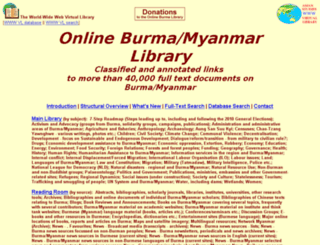Focal point
Location
The Online Burma/Myanmar Library (OBL) is a non-profit online research library mainly in English and Burmese serving academics, activists, diplomats, NGOs, CSOs, CBOs and other Burmese and international actors. It is also, of course, open to the general public. Though we provide lists of Burma/Myanmar news sources, the Library’s main content is not news but in-depth articles, reports, laws, videos and links to other websites, We provide a search engine (database and full text) and an alphabetical list of categories and sub-categories, but the Library is best accessed through browsing the 100 or so categories which lead to sub- and sub-sub categories. These tools should be used in combination.
Members:
Resources
Displaying 66 - 70 of 1151Legally and Illegally Logged Out: Drivers of Deforestation & Forest Degradation in Myanmar
... Myanmar’s forest and timber sector has been central to the country’s economy and society, particularly over the last century. Since the colonial era, timber has been a major export revenue earner to Burma/Myanmar and thus subject to much political debate (Bryant 1996). In addition to timber export revenues, the forests of Myanmar have always provided timber and non-timber forest products for domestic consumption as well as a range of environmental services including water catchment, habitat for flora and fauna, carbon storage, and soil nutrient recovery in rotational agriculture.
Customary Tenure in Myat Latt Village, Magwe Division, Myanmar
Key findings:
"There is no landlessness in the village
and the land is shared equitably. The
land cannot be sold and belongs to the
community. It is the basis of their livelihood and the future of their children.
The forest outside community forest area in Myay Latt territory is being logged
by outsiders. The villagers tried to tackle
illegal logging but due to corruption and
lack of law enforcement, this is still increasing. Recognition of these customary forest areas and of the community's
good practices is important so that the
Customary tenure in Nan-Pan village, Southern Shan State, Myanmar
Key findings:
"There is no landlessness in the village
and the shifting cultivation land is divided
equitably for farming. However,
there is the concern that part of their
shifting cultivation area has been classified
as reserved forests by MOECAF. So
this land could possibly be granted by
government to businesses.
The villagers did not apply for titles during
the latest land registration process.
The community does not wish for private
land registration even on terraces
UNDERNUTRITION IN MYANMAR Part 2: A Secondary Analysis of LIFT 2013 Household Survey Data
Executive Summary:
UNDERNUTRITION IN MYANMAR Part 1: A Critical Review of Literature
Abstract:


